
By: Joe Strafaci,
Hacking a device, including one that you rightfully own, has been illegal under the Section 1201 of the Digital Millennium Copyright Act (DMCA) since 1998.[1] In effect, it prevents anyone from reverse-engineering hardware or software on any product they obtain in the marketplace.[2] While this might seem odd at first, companies have routinely cited its importance for maintaining the security of their products. This application ranges from protecting the copyright behind everything from a PlayStation to an automobile.[3]
But advocacy groups have long argued that certain types of hacking based on goodwill actually serves to help these companies and the general public. Recent research-oriented hackers have risked prosecution to show vulnerabilities in certain products.[4] Some examples of this research that includes showing how insulin pumps can be hacked to induce an overdose and how a Jeep could be hacked to affect the brakes and transmission.[5] As a result of this advocacy, an exemption finally kicked in on October 28, 2016 which will now permit what may be viewed as “good faith” hacking. While it permits the hacking of devices, the exemption will not provide a full bar from prosecution under Section 1201 of the DMCA.[6]
Several limitations have been placed on the exemption to permit hacking of commercial hardware and software products. The exemption only applies to what the DMCA refers to as “good faith” testing. This means that individuals will only be able to avoid the threat of prosecution if they are conducting their testing for the purpose of public safety or some similar reasoning. Additionally, any hacking or testing must be performed in a controlled environment in an effort to prevent potential harm to individuals involved or the public in general. Lastly, it is important to note that this exemption will only be active for two years, although it could potentially be extended.[7]
As a result of these limitations, the ability to hack into an individual’s own device will likely be severely limited. Different exemptions still exist for conducting specific activities, such as jail-breaking an iPhone.[8] However, most of the testing and hacking that the DMCA protects will be unavailable to the common individual. Due to these limitations, any individual that is not part of some type of research group is likely to risk prosecution under Section 1201.[9]
Despite these limitations, the general public will likely benefit greatly from this new exemption. It will allow sophisticated researchers to point out vulnerabilities in hardware and software that is now utilized in almost every industry. Furthermore, it will enable research groups to enact a degree of corporate oversight. For example, the recent Volkswagen scandal was initially brought to the attention of the public because researchers had reverse-engineered a Volkswagen automobile to show how Volkswagen had rigged its software to cheat emissions testing.[10] The limitations referenced above are likely a small price to pay for the general good that can come by providing an exemption to Section 1201 of the DMCA.
[1] See Digital Millennium Copyright Act, 17 U.S.C. § 1201 (1998).
[2] See id.
[3] See Understanding the Section 1201 Rulemaking, U.S. Copyright Office (Oct. 28, 2015).
[4] See Andy Greenberg, It’s Finally Legal to Hack Your Own Devices, Wired, (Oct. 31, 2016), https://www.wired.com/2016/10/hacking-car-pacemaker-toaster-just-became-legal/.
[5] See id.
[6] See id.
[7] See id.
[8] See Thomas Fox-Brewster, DMCA Ruling Ensures You Can’t Be Sued for Hacking Your Car, Your Games Or Your iPhone, Forbes, (Oct. 27, 2015), http://www.forbes.com/sites/thomasbrewster/2015/10/27/right-to-tinker-victory/#38a249a938ae.
[9] See id.
[10] See id.
Photo Source:
https://4.bp.blogspot.com/-JsC9iiSsZeM/VyMc4TTMWtI/AAAAAAAAn5s/KnN0ZyjFnkwLkzEQznsr_fYfiRNlM0dAACLcB/s1600/hack-any-computer.png
